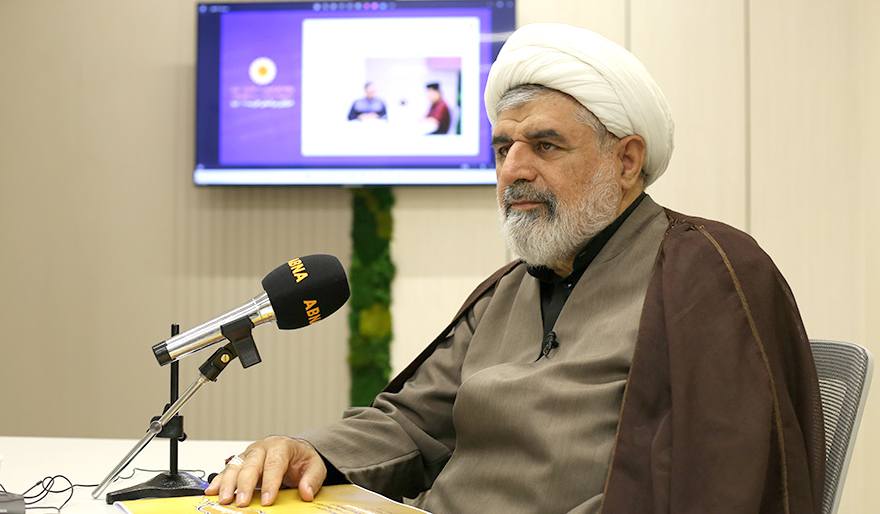AhlulBayt News Agency (ABNA): On Wednesday morning, July 10, 2024, Hojat al-Islam Dr. Mohammad Saeed Bahmanpour, writer, religious researcher, and former president of the London Islamic College, visited AhlulBayt (a.s.) International News Agency. While getting to know the different sections and activities of this religious and international News Agency, he offered suggestions for its development.
In response to the question, “What is the role of art in disseminating the AhlulBayt (a.s.) teachings?” and “What things are effective in the better convey of these teachings?” he said, “We can find the best answer is Imam Reza’s (a.s.) words: “فَإِنَّ النّاسَ لَوْ عَلِمُوا مَحاسِنَ کَلامِنا لاَتَّبَعُونا” (If people learn the virtues of our words, they would follow us.” The virtues of the words of AhlulBayt (a.s.) should be expressed in a vernacular manner so that they can be understood by the conscience of all people. In this regard, we can find many cases in the Holy Quran and hadiths that address the conscience of all mankind not only Muslims or Shiites.”
“The Holy Quran is a work of art,” Dr. Bahmanpour stated, “If the Quran was not a work of art, it would not have influenced the polytheists. In the beginning, the Holy Quran did not address the Muslims but rather called on non-Muslims. Therefore, they converted to Islam due to some general concepts of the Quran that provoked consciences.”
Referring to the story of Uthman bin Mazoun, one of the companions of the Holy Prophet (p.b.u.h), who was a friend of the Prophet in the era before his mission, this author and religious researcher stated, “He was not Muslim at first, but he was always a friend and companion of the Prophet (p.b.u.h). After verse 90 of Surah An-Nahl was revealed to the Prophet (p.b.u.h): “إِنَّ اللَّهَ يَأْمُرُ بِالْعَدْلِ وَالْإِحْسَانِ وَإِيتَاءِ ذِي الْقُرْبَىٰ وَيَنْهَىٰ عَنِ الْفَحْشَاءِ وَالْمُنْكَرِ وَالْبَغْيِ ۚ يَعِظُكُمْ لَعَلَّكُمْ تَذَكَّرُونَ” (Allah commands justice, the doing of good, and liberality to kith and kin, and He forbids all shameful deeds, and injustice and rebellion: He instructs you, that ye may receive admonition); he was influenced by its clear message and changed, and then converted to Islam.”
Regarding the channel Atlas, active in social media, the former president of the Islamic College of London, said, “In this channel, every week a short sentence or verse from the Holy Quran, with a general audience, is posted. Among the verses of the Holy Quran with a general audience are: “وَلَا تَنْسَوُا الْفَضْلَ بَيْنَكُمْ” (And do not forget Liberality between yourselves) (2: 237), “لَا تَظْلِمُونَ وَلَا تُظْلَمُونَ” (Deal not unjustly, and ye shall not be dealt with unjustly) (2: 279), “إِنَّ اللَّهَ يَأْمُرُ بِالْعَدْلِ وَالْإِحْسَانِ” (Allah commands justice, the doing of good) (16: 90), and “إِذَا حَكَمْتُمْ بَيْنَ النَّاسِ أَنْ تَحْكُمُوا بِالْعَدْلِ” (And when ye judge between man and man, that ye judge with justice) (4: 58).”
“It is essential for us to specifically focus on the concepts with the general audience and adjust our other discourse accordingly. If we use the name of AhlulBayt (a.s.), we will only attract the AhlulBayt (a.s.) followers. While, if we express their words in the form of art, it will attract the audience towards the owner of that word or action – that is, the Infallibles (a.s.),” he added.
At the end of his speech, while reemphasizing that “the Quran is a work of art”, Hojat al-Islam Bahmanpour stated, “We should consider this issue as our model and express Islamic teachings with the language of art. An artist and painter like Picasso could influence the world with his art, which indicates the attractiveness of art in the eyes and thoughts of the world people.”
**************
End/ 345

